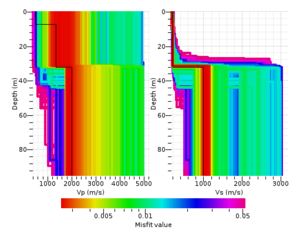Difference between revisions of "Dinver:Parameterization"
| Line 4: | Line 4: | ||
From the 2-layer model described in [[Dispersion curve inversion#Defining the parameter space|Dispersion curve inversion]]: | From the 2-layer model described in [[Dispersion curve inversion#Defining the parameter space|Dispersion curve inversion]]: | ||
| + | |||
| + | |||
| + | [[Image:Dinverdc_3layerparams.png|thumb|right|300px|A 3-layer model with only one layer in Vp profile]] | ||
* Add two layers for '''Vs''' profile by clicking once times on ''Add'' button in ''Shear velocity profile''. | * Add two layers for '''Vs''' profile by clicking once times on ''Add'' button in ''Shear velocity profile''. | ||
* Re-link '''Vp''' interface to '''Vs''' interface by selecting ''Vs1'' in ''Linked to'' combo box. | * Re-link '''Vp''' interface to '''Vs''' interface by selecting ''Vs1'' in ''Linked to'' combo box. | ||
| − | + | <br style="clear: both"/> | |
[[Image:Dinverdc_3layerresults.png|thumb|right|300px|3-layer results: Vp and Vs profiles]] | [[Image:Dinverdc_3layerresults.png|thumb|right|300px|3-layer results: Vp and Vs profiles]] | ||
Add a new run and start it. Misfit now drops far below 0.01, with a much better fit of the dispersion even at high frequency. The true profile is correctly retrieved. Vp is also well estimated because the dispersion curve contains absolutely no noise. For real cases, fitting the dispersion curve with a misfit below 5-10% is not frequent. | Add a new run and start it. Misfit now drops far below 0.01, with a much better fit of the dispersion even at high frequency. The true profile is correctly retrieved. Vp is also well estimated because the dispersion curve contains absolutely no noise. For real cases, fitting the dispersion curve with a misfit below 5-10% is not frequent. | ||
| + | |||
| + | Do we recover Vs profile down to 100 m (and probably below, because parameterization was forced to 100 m) with a dispersion curve from 2 to 20 Hz (maximum wave length=318 m)? Testing the uncertainty in the bottom part of the model solves this issue. | ||
| + | |||
| + | == A 4-layer model == | ||
Revision as of 18:44, 23 February 2010
There is no unique way of defining a correct parameterization and there is currently no commonly accepted strategy to conduct an inversion. This document presents an example based on the same dispersion curve as in Dispersion curve inversion, revisited with various parameterizations.
A 3-layer model
From the 2-layer model described in Dispersion curve inversion:
- Add two layers for Vs profile by clicking once times on Add button in Shear velocity profile.
- Re-link Vp interface to Vs interface by selecting Vs1 in Linked to combo box.
Add a new run and start it. Misfit now drops far below 0.01, with a much better fit of the dispersion even at high frequency. The true profile is correctly retrieved. Vp is also well estimated because the dispersion curve contains absolutely no noise. For real cases, fitting the dispersion curve with a misfit below 5-10% is not frequent.
Do we recover Vs profile down to 100 m (and probably below, because parameterization was forced to 100 m) with a dispersion curve from 2 to 20 Hz (maximum wave length=318 m)? Testing the uncertainty in the bottom part of the model solves this issue.

